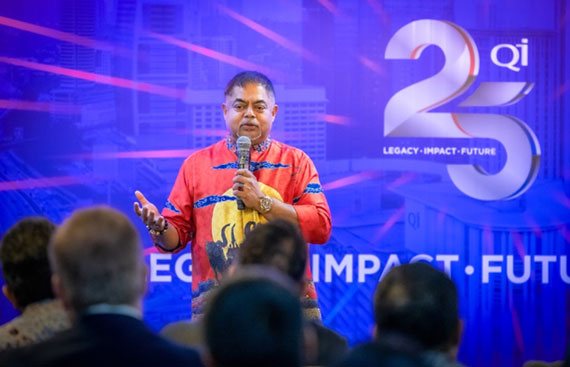QI Group's Roadmap to Sustainable Success: A Diversified, Global Approach

Few business philosophies trace their origins to Mahatma Gandhi, but QI Group built its entire corporate philosophy around a lesson from the independence leader. The multinational conglomerate operates across five distinct sectors, from Swiss luxury watches to a Malaysian university, guided by what founders call the RYTHM philosophy — Raise Yourself To Help Mankind — and four core values: integrity, service, sustainability, and leadership. Today, the company operates across more than 30 nations, employing over 2,000 people representing nearly 50 different countries.
Co-founded by Vijay Eswaran and Joseph Bismark, the organization began with direct selling operations before expanding into education, hospitality, luxury goods, and sustainable retail. The founders established their business during the Asian financial crisis of 1997-1998, a period when many companies faced significant challenges. Persevering through the downturn, they were able to establish a foundation that would support decades of subsequent international growth.
“We have been through so many challenges in the last two decades that many observers are amazed we are still around,” said Eswaran, the company’s executive chairman. "I'd like to think that the secret sauce keeping us on track is RYTHM.”
What Is the Vision of the QI Group?
The QI Group’s vision is to build a purpose-driven global business that uplifts communities through education, empowerment, and sustainable development — guided by its RYTHM philosophy: “Raise Yourself To Help Mankind.”
This philosophy was inspired by Mahatma Gandhi’s principle of self-improvement before service, and continues to drive every business and community decision.
“We were very clear that we have a greater purpose other than being profit-driven,” said Executive Chairman Vijay Eswaran. “The ideology of putting shareholders above all else needs a serious update.”
The RYTHM Foundation, the social impact arm of the company, channels 10% of annual revenue into projects aligned with this vision—spanning education for children with special needs, women’s vocational training, and rural development in underserved communities.
Environmental stewardship is another pillar, with 25,000 trees planted across 11 countries via the Green Legacy initiative since 2021.
Internally, the company’s Community Impact Program has logged over 125,000 hours of employee volunteerism since 2013.
What Industries Does QI Group Operate In?
The company's expansion approach demonstrates deliberate growth across several sectors that support its guiding values. Quest International University, established in the state of Perak, Malaysia, anchors the education division. Since 2011, QIU has welcomed approximately 15,000 students from nearly 50 countries, offering programs in medicine, engineering, business, and information technology.
The university’s growth received support through innovative financing mechanisms. QI Group partnered with a leading Malaysian bank to finance a $21.48 million Sukuk Ijarah program, marking the company's first entry into Malaysia's capital markets. This approach will fund the construction of state-of-the-art facilities and learning centers, ensuring students access to modern educational resources.
The hospitality division operates boutique hotels and resorts across Thailand, Malaysia, Sri Lanka, and Turkey, emphasizing eco-tourism principles. Prana Resort Nandana in Koh Samui, Thailand, demonstrates environmental commitment, earning a gold rating from Thailand's Green Hotel Standard. The property implements comprehensive sustainability measures including paperless check-ins, locally sourced ingredients, and beach cleanups to prevent marine waste.
QI Group's luxury division manages two prestigious Swiss watch brands. Cimier, celebrating its centennial in 2024, represents traditional Swiss watchmaking heritage, while the Bernhard H. Mayer Collection, established in 1871, offers exclusive timepieces and jewelry.
The retail portfolio includes Down to Earth, an organic grocery chain operating six locations across Hawaii. Established in 1977, it was acquired by QI Group in 2007. The chain specializes in vegetarian and all-natural products, hosting community-focused activities like cooking classes and nutrition seminars in local schools and hospitals.
How Does QI Group Develop Its People and Leaders?
The company’s management and development principles emphasize servant leadership over traditional hierarchical structures.
"I believe that leadership is not about telling people what to do. A true leader is one who knows how to serve," said Eswaran.
Who Is the Owner of QI Group?
QI Group is a privately held company co-founded and jointly led by Executive Chairman Vijay Eswaran and Deputy Chairman Joseph Bismark.
Rather than having a single owner, the organization is governed by a board of directors, with both co-founders continuing to play key leadership roles.
-
Vijay Eswaran is a Malaysian-born entrepreneur with degrees in socioeconomics and business from the UK and US. After a corporate setback early in his career, he founded the QI Group during the Asian financial crisis in 1998.
- Joseph Bismark brings a holistic leadership approach shaped by his upbringing in an ashram and lifelong practices in yoga, taekwondo, and vegetarian living — elements that have informed the Group’s health, wellness, and sustainability ventures.
Together, they embody a dual-leadership model combining business strategy and values-driven culture.
The company's workforce encompasses individuals from roughly 50 different countries speaking over 50 languages, with employees ranging from 19 to 65 years old. Women represent 47% of employees and 33% of management positions.
Professional development occurs through structured programs including The Zone, a four-day program led by Eswaran himself, and STEER (Service, Teamwork, Enrichment, Excellence, and Resolve), a three-day employee training initiative led by Deputy Chairman Joseph Bismark. It also includes initiatives like iLead, which connects women leaders in the company to mentor up-and-coming employees. These programs foster confidence and career development while reinforcing the company's core values.
The combination of Eswaran's business acumen and Bismark's holistic management approach has created a corporate culture that balances commercial success with social responsibility, positioning the company for continued growth across multiple sectors while maintaining its commitment to the RYTHM philosophy.
